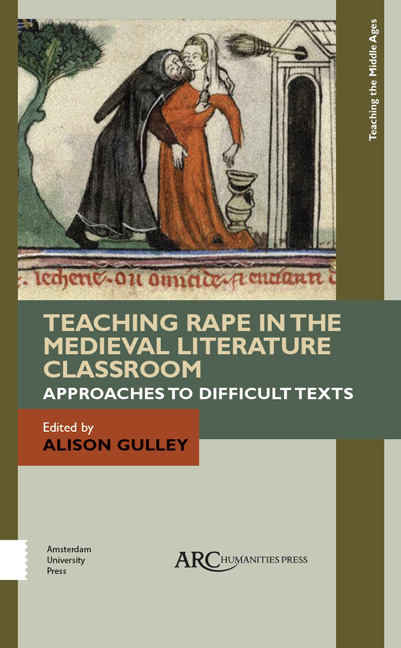Book contents
- Frontmatter
- Contents
- Acknowledgements
- Chapter 1 Introduction: Teaching Rape and Meeting the Challenges of the TwentyFirstCentury Classroom
- Chapter 2 Medieval Saints and Misogynist Times: Transhistorical Perspectives on Sexual Violence in the Undergraduate Classroom
- Chapter 3 Teaching Medieval Rape Culture across Genre: Insights from Victimology
- Chapter 4 Bringing the Bystander into the Humanities Classroom: Reading Ancient, Patristic, and Medieval Texts on the Continuum of Violence
- Chapter 5 From Bystander to Upstander: Reading the Nibelungenlied to Resist Rape Culture
- Chapter 6 Speech, Silence, and Teaching Chaucer’s Rapes
- Chapter 7 Classroom PSA: Values, Law, and Ethics in “The Reeve’s Tale”
- Chapter 8 “How do we know he really raped her?”: Using the BBC Canterbury Tales to Confront Student Skepticism towards the Wife of Bath
- Chapter 9 Teaching the Potiphar’s Wife Motif in Marie de France’s Lanval
- Chapter 10 Sexual Compulsion and Sexual Violence in the Lais of Marie de France
- Chapter 11 Troubadour Lyric, Fin’amors, and Rape Culture
- Chapter 12 The Knight Coerced: Two Cases of Raped Men in Chivalric Romance
- Chapter 13 Teaching Rape to the HeMan Woman Haters Club: Chrétien de Troyes at a Military School
- Chapter 14 Rape, Identity, and Redemption: Teaching “Sir Gowther” in the Community College Classroom
- Notes on Contributors
- Index
Chapter 2 - Medieval Saints and Misogynist Times: Transhistorical Perspectives on Sexual Violence in the Undergraduate Classroom
Published online by Cambridge University Press: 23 January 2021
- Frontmatter
- Contents
- Acknowledgements
- Chapter 1 Introduction: Teaching Rape and Meeting the Challenges of the TwentyFirstCentury Classroom
- Chapter 2 Medieval Saints and Misogynist Times: Transhistorical Perspectives on Sexual Violence in the Undergraduate Classroom
- Chapter 3 Teaching Medieval Rape Culture across Genre: Insights from Victimology
- Chapter 4 Bringing the Bystander into the Humanities Classroom: Reading Ancient, Patristic, and Medieval Texts on the Continuum of Violence
- Chapter 5 From Bystander to Upstander: Reading the Nibelungenlied to Resist Rape Culture
- Chapter 6 Speech, Silence, and Teaching Chaucer’s Rapes
- Chapter 7 Classroom PSA: Values, Law, and Ethics in “The Reeve’s Tale”
- Chapter 8 “How do we know he really raped her?”: Using the BBC Canterbury Tales to Confront Student Skepticism towards the Wife of Bath
- Chapter 9 Teaching the Potiphar’s Wife Motif in Marie de France’s Lanval
- Chapter 10 Sexual Compulsion and Sexual Violence in the Lais of Marie de France
- Chapter 11 Troubadour Lyric, Fin’amors, and Rape Culture
- Chapter 12 The Knight Coerced: Two Cases of Raped Men in Chivalric Romance
- Chapter 13 Teaching Rape to the HeMan Woman Haters Club: Chrétien de Troyes at a Military School
- Chapter 14 Rape, Identity, and Redemption: Teaching “Sir Gowther” in the Community College Classroom
- Notes on Contributors
- Index
Summary
Although most undergraduate students enter the college classroom with little or no experience reading medieval texts, they are avid consumers of popular culture— and they are confident that rape was more widespread and considered less serious in the Middle Ages than it is the contemporary United States. Because student perspectives on the long history of sexual violence are more likely to have their source in contemporary novels, movies, and television shows like the popular HBO series Game of Thrones than in medieval texts like the Life of St. Agnes, they tend to identify pervasive acts of sexual violence and callous, misogynist attitudes toward rape as signs of historical alterity. At the private university where I have taught English literature and gender studies for the last nine years, I design my courses to complicate this perspective.
The guiding premise of this essay is that medieval representations of rape can be a valuable tool in students’ exploration of contemporary antirape politics and practices, and not only as one more example of misogyny in the long history of rape culture. Over the last twentyfive years, feminist scholars have rightly pointed out that teachers of medieval literature have too often sanitized medieval misogyny by passing over representations of sexual violence without comment or, worse, by glossing rape as seduction. To correct this elision, instructors have increasingly foregrounded medieval representations of rape, such as those endured by Malyne and Symkyn's wife in Chaucer's “The Reeve's Tale.” Yet, an exclusive focus on moments that normalize sexual assault can confirm students’ confidence that there was more rape in the Middle Ages than there is today and that women then did not enjoy as much autonomy (sexual or otherwise) as women do now. While these views are correct to an extent, they miss the complexity of both medieval and modern attitudes toward rape, and they allow students’ own comparatively progressive attitudes to escape critical examination. The Middle Ages can become an emblem of gender inequalities that contemporary culture— particularly on college campuses where much antirape activism has focused over the last few years— has transcended.
- Type
- Chapter
- Information
- Teaching Rape in the Medieval Literature ClassroomApproaches to Difficult Texts, pp. 12 - 28Publisher: Amsterdam University PressPrint publication year: 2018



